The Big Event for Mental Health: A WHO initiative on Global Awareness and Investment in World Mental Health
By Crystal Nuñez
Published October 2020
The Big Event for Mental Health: A WHO initiative on Global Awareness and Investment in World Mental Health
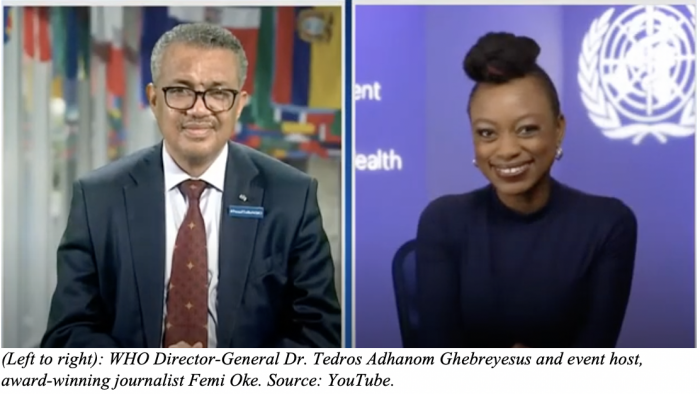
Annually on October 10, World Mental Health Day is celebrated around the world to advance advocacy and awareness about mental illnesses and acknowledge its effects on daily life. With these goals in mind, the first-ever event on this day, sponsored by the World Health Organization (WHO), was celebrated this year. The event highlighted advances and preventive measures in mental health care worldwide. The event also promoted mental health advocacy in collaboration among governmental, non-governmental, public agency partners, and individuals worldwide.
Present disruptions of COVID-19 on all aspects of society require events to be held virtually. As a result, the event was hosted as a webinar. WHO sponsored the event with the co-sponsorship of the World Federation for Mental Health (WFMH) and United for Global Mental Health (United GMH), two organizations with a network of professionals, and others committed to mental health. Participating were many celebrities, prominent public figures, various partners, and individual voices from varied initiatives. Given the context of the pandemic, the added aim of the day was to stimulate awareness of mental health globally during shutdowns and impacts of quarantining and self-isolating.
While the celebration included several events, this report covers The Big Event for Mental Health that focused on the importance of investment in mental health.
Background
Individuals of all creeds, colors, races, incomes, and religions share a common struggle with mental illness. Yet, available, affordable, and adequate mental health access is lacking for those who need it urgently in health systems around the world—especially in low- and middle-income countries (LMICs) (Wainberg et al., 2017, p. 28). The Novel Coronavirus (COVID-19) outbreak in early 2020 and the progression of the virus into a global pandemic seriously disrupted mental health services when these resources were most needed. Stress, isolation, and physical-distancing caused by the pandemic led to an increase in adverse psychological and psychiatric consequences (Haider et al., 2020, p. 36).
The theme of this Mental Health Day 2020 was "Move for Mental Health: Increased Investment in Mental Health." The event was meant to highlight the global community's investment to push public access to mental health care and advocate mental health literature.
The identification of a theme was first done in 1994, as "Improving the Quality of Mental Health Services throughout the World." Subsequent themes focused on mental health and topics or groups, like women, children, human rights, aging, and workplace mental health. They included, "The Effects of Trauma and Violence on Children and Adolescents"; "Emotional and Behavioural Disorders of Children and Adolescents"; "The Relationship Between Physical & Mental Health: Co-Occurring Disorders"; "Mental and Physical Health Across the Life Span"; "Building Awareness — Reducing Risk: Mental Illness and Suicide"; "Mental Health in a Changing World: The Impact of Culture and Diversity"; "Making Mental Health a Global Priority: Scaling up Services Through Citizen Advocacy and Action"; "Mental Health in Primary Care: Enhancing Treatment and Promoting Mental Health"; "Mental Health and Chronic Physical Illnesses"; "The Great Push: Investing in Mental Health"; "Depression: A Global Crisis"; "Mental Health and Older Adults"; "Living with Schizophrenia"; "Dignity in Mental Health"; "Psychological First Aid"; "Mental Health in the Workplace"; "Young People and Mental Health in a Changing World"; and "Mental Health Promotion and Suicide Prevention."
Background: The World Health Organization and Mental Health Awareness
The mission of WHO is to improve and achieve the highest level of health for all, everywhere. This commitment extends beyond ensuring physical health and includes mental and social well-being. The achievement of this holistic view of health is considered a fundamental human right.
The purpose of The Big Event for Mental Health held in celebration of the 2020 Mental Health Day was summarized by the moderator, award-winning journalist Femi Oke, who opened the proceedings. She said,
"The reason we're here, The Big Event for Mental Health, [are] three big reasons. One is so we can really get to know the WHO a little bit better and what it does for mental health care...Also, how do we look after our mental health a little bit better? That's another big point. Also, encouraging us all, civil society, governments, advocates, social services to invest more in mental health."
This event occurs in the context of the present society where 16 percent of youth, age 10-19, account for the global burden of mental health conditions, and suicide is recorded as the third leading cause of death for 16-19-year-olds globally (World Health Organization [WHO], 2020). Additionally, the World Health Organization noted (WHO, 2001) 1 in 4 people worldwide will be affected by mental illness or disorders, and 450 million people are currently affected by mental conditions. These mental illnesses impact their own everyday lives and that of their family, community, and society. Disorders can lead to other related struggles, such as substance abuse.
The Investment in Mental Health
Given the theme for 2020's World Mental Health Day as "Move for mental health: Increased investment in mental health," investment was a keyword throughout the event, presented as the key concept in future mental health initiatives. The theme of investment covers a personal reflection on one's mental health and how the future of mental health can be improved upon in society by other factors. This theme implies the importance of establishing positive mental health as a universal and fundamental human right, as stated in the document about Universal Health Coverage (UHC) (WHO, 2019), and the need for mental health services to achieve through UHC. The goal is that people and communities can equitably access needed health services without commonly experienced financial hardships (WHO, n.d.). Mental health is included in the call for UHC, and fulfillment of services for those with mental health needs serves as an economic investment in preventing people from falling into poverty, as well as a relief for those trapped in the cycle of poverty.
The importance of this year's World Mental Health Day is underscored by the compromises to mental health caused by the global pandemic—evident in social and physical isolation, fear of contamination, and political and economic unpredictability. These conditions have led to increased negative consequences on mental health, such as anxiety, Post-Traumatic Stress Disorder (PTSD), depression, suicide, and violence, both domestic and otherwise. Brooks et al. (2020) report adverse effects of mandatory quarantines have become prominent for all individuals, even those not previously suffering from adverse mental health (p. 912-920). Investment needed internationally from governments and non-governmental agencies will ultimately help alleviate the Novel Coronavirus's mental health impact and help set mental health norms and standards globally.
The Big Event for Mental Health is in sync with major international documents about mental health. The United Nations Sustainable Development Goals (SDGs)—developed during the UN 2012 conference on Sustainable Development in Rio de Janeiro and further drafted and then adopted by the member state governments of the UN in 2015, includes global mental health as a universal objective in Goal 3: "Good Health and Well-being for all." Mental health is also called for in Target 3.4: "Reducing premature mortality from non-communicable diseases through prevention and treatment tactics, and the promotion of mental health and well-being, by 2030 (WHO, n.d.)." The Big Event has similar objectives noted in Goal 10, which calls to reduce inequality globally, as well as in SDG 16.b: Promote and enforce non-discriminatory laws and policies.
The urge for action by the WHO, celebrities, and world leaders is accented through the call for unification through collaboration of social services, governments, and individuals to raise awareness of mental health education/literature, resources, and building a community of advocates. Unprecedented needs caused by the current international health crisis of COVID-19 have impacted individuals' mental health status, including vulnerable adolescents, young people, and healthcare workers worldwide. This impact puts a more significant emphasis on the Big Event for World Mental Health, emphasizing the importance of good mental health for our future and welcoming voices willing to fight for good mental health.
Some countries featured in the event taking part in mental health investments through community outreach and national policies were Singapore, Belize, Lebanon, South Africa, Kyrgyzstan, Jordan, and Croatia, among many other allies.
Mental Illness Awareness Education and Advocacy
The global community has identified the Novel Coronavirus's mental health impact as an increasing threat in these troubling times. Ritchie (2018) states that statistically, pre-COVID times showed that 1 in 7 (~11-18 percent) individuals worldwide suffer from mental health or substance use conditions. With the Coronavirus ravaging societies internationally, mental health disorders and substance abuse have risen tremendously due to public health fragility and societal consequences. A global study on the mental health impact of COVID-19 identified the significant worldwide implications of the COVID-19 pandemic on mental health within twelve participating countries and other countries in WHO regions (Płomecka et al., 2020). The researchers recognized exceeding self-reports of general psychological disturbances, PTSD, and depression.
Additionally, Płomecka et al. (2020) note that the coronavirus pandemic is also pushing many populations in countries with unstable economies and a lack of mental health policies into a mental health crisis. For example, countries exposed to the effects of COVID-19 with a lack of mental health public policy and an inadequate mental health care system suffer from higher rates of individuals with mental health disorders, thus creating high adverse economic and social conditions. These confounding factors demand proper investment in mental health initiatives.
The fact that WHO hosted this global online advocacy event on mental health highlights the importance of overall investment that world organizations and nation-states need to commit to forging a future with quality and convenient mental health services for all, especially during these difficult times. World leaders, celebrity guests, non-governmental organizations (NGOs), mental health experts, and WHO Director-General Dr. Tedros Adhanom all came together to advocate for improving mental health care globally. All these actors emphasized the need for greater availability in mental health care for all individuals. This event is significant when access to mental health care and services is disrupted or halted in 93 percent of countries worldwide due to the pandemic (WHO, n.d.).
The Incorporation of Social Media And The Youth
Through the use of the webinar platform and social media, participants around the world were able to stream the Big Event via all social platforms such as Twitter, YouTube, TikTok, Facebook, and LinkedIn. They also could participate in the campaign through a live Q&A session and online post creations.
The Big Event was accompanied by the participation of youth-favorites, like the K-Pop band SuperM. The group performed their song, "Better Days," written with a similar message towards overall mental well-being and self-healing. With a message relevant to the event, the music inspired feelings of hope and empathy during difficult situations and bringing everyone together to make a "better day." SuperM illustrates modern celebrities' role and young celebrities' willingness to discuss mental health. Their function, especially as music stars, can be incredibly impactful. In my view, such public discussion of the topic helps alleviate the stigma behind mental illness and substance abuse, so often suffered by young music stars.
The presence of a musical aspect to the Big Event brought the power of music and youth participation to an awareness of the critical topics of mental-health literacy, and emphasized the value of allies —no matter their age. The fact that WHO made such an event available online for all decreases the taboo about mental health. Having celebrities whom young people admire and consider as role models advocate for the event destigmatizes mental health and substance abuse conditions.
Youth suicide is of significant concern in the mental health field. The dangers of suicide are shown to the public by spotlighting the stories of famous youth. Youth voices in the music field are especially important to young people. The tragedy of youth suicide was brought home on the Big Event by the tragic deaths of K-pop singers 28-year-old Goo Hara, her close friend 25-year-old Sulli from cyberbullying, and boy band Shinee's Jong-Hyun. Additionally, musicians who took their lives due to substance abuse were Swedish DJ and singer Avicii and Chester Bennington from the band Linkin Park. The Big Event for Mental Health brought this issue to light by including not only a performance by the K-pop band SuperM with their song about life and hope but also a heart-wrenching statement by the father of Avicii, Klas Bergling. As a tribute to his son, one of Avicii's songs was played during the webinar.
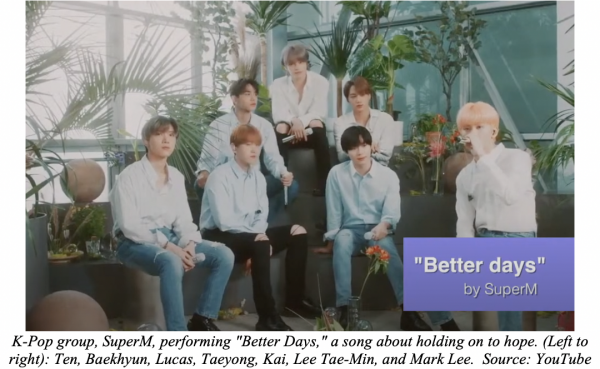
Factors of Successful Messaging
Several factors contribute to breaking down barriers to investment in support of positive mental health. These factors include: the Big Event being hosted by a powerful agency like the WHO, celebrities' engagement, and dissemination through social media. Celebrity outreach has also encouraged youth participation throughout the world and highlighted youth-speakers who are part of initiatives sponsored by the United Nations Children's Fund (UNICEF), a UN agency devoted to protecting children. The initiatives profiled in the Big Event included the youth-led Helping Adolescents Thrive (HAT) project in Belize, the Early Adolescent Skills for Emotions (EASE) project in Jordan, and the STARS/Chommie digital mental health chatbot project in Cape Town, South Africa.
The Big Event Program
The 3-hour Big Event, as mentioned above, began with the remarks of Femi Oke, an international journalist of Al Jazeera. Oke was the recipient of the "African Achievers 2007 Award", presented by The Economic Community of West African States (ECOWAS). She introduced WHO Director-General Dr. Tedros Adhanom Ghebreyesus. Through his remarks, Dr. Tedros— as he is popularly called—explained the role of the WHO during the event.
"Mental health is one of the most neglected areas of public health," said Dr. Tedros. "And this was true even before the pandemic, and the pandemic is further complicating it. Billions of people have been affected by the COVID-19 pandemic, which is having a further impact on mental health, worse than it used to be."
Building on Dr. Tedros' statement, Oke transitioned to explain the WHO Special Initiative for Mental Health, launched two years ago, and covering a five-year-period (2019-2023) of striving to provide accessible and quality mental health worldwide (WHO, n.d.). The initiative, Oke noted, shows that "there is nothing impossible as far as improving mental health conditions and services around the world." The project tracks twelve countries over five years to see what they do with their respective national mental health plan.
Progress of six of the twelve nations was presented at this event. Zimbabwe, expanding its mental health workforce, has updated it's old mental health laws, created services for children, young people, and the elderly, and emphasized leadership for mental health. The Philippines reported expanding access to quality mental health care, improving treatment coverage, and training healthcare workers to support people with mental health conditions while protecting their rights. Ukraine, working with partners and authorities, reported creating a community-based and person-centered mental health care model, training primary healthcare workers and community workers to help people with mental health problems, and supporting people facing humanitarian crises. Jordan admitted that while most of its mental health services are provided in the capital of Amman, efforts are underway to expand mental health care in rural areas and create equity within the field of mental health care. They pledge to strengthen the public sector's role in mental health and enhance community health services instead of long-term institutional care. While updating its mental health policies, Paraguay is working with its indigenous communities and strengthening community healthcare while protecting people with mental health conditions. Lastly, in Bangladesh, the goals are to include mental health in primary healthcare, adopting a mental health policy and a strategic plan, increase the budget for mental health, and train hundreds of mental health care workers.
An eye-opening point for me, amid all this extensive conversation about COVID-19, was the impact on young children regarding mental health education and literature. For example, Oke spotlighted the story of My Hero is You, which calls to attention the outcome on youth of COVID-19 and measures to stop the spread, such as sickness, anxiety, and general uncertainty. Yet, the story highlights hope and coping through accounts of 1,700 children, parents, caregivers, and teachers from more than 100 countries living through the pandemic. The tale demonstrates how we can all come together during challenging times by relating to one another despite dire circumstances.
Next in the program, celebrity guests offered statements about mental health. These included Alisson Becker, Brazilian professional footballer and Goalkeeper for Premier League club Liverpool, and his wife, medical doctor, Dr. Natalia Loewe Becker. The Beckers, WHO Goodwill Ambassadors for Health Promotion, stress not just looking after your physical health by focusing on a healthy diet, but also your mental health. They also accentuate finding time to relax and connect with loved ones remotely during these challenging pandemic times.
Next, Lee Hsien Loong, Prime Minister of Singapore, raised the importance of awareness about mental health and the stigma of people with mental health conditions who are not "well understood or fully accepted." World governments must fight COVID-19 and its impact on its population's mental health, he said. He added that 1 in 7 people in Singapore suffer from a mental health condition at some point in their lives, ensuring healthcare and mental health literacy are the only way forward.
Following Minister Loong was a presentation by Autism Speaks, an organization that emphasizes caregiver skills and parent training for children with developmental delays and disabilities. There are 50 million children with a developmental disability, such as autism and intellectual disabilities. Many of these children are left behind and excluded from benefiting from proper care and community opportunities. These children are also more likely to experience violence, neglect, and other forms of abuse. To counter this, Autism Speaks joined with WHO to provide literacy for parents to combat stigma and has provided a skills-training program supervised by community health care workers. This training program has been implemented in more than 30 countries.
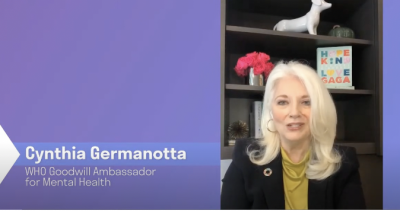 In the next presentation, Cynthia Germanotta, a WHO Goodwill Ambassador for Mental Health, and President and Co-Founder of the Born This Way Foundation along with daughter, artist Lady Gaga, described the foundation's mission to support the wellness of young people with acceptance, inclusivity, and kindness. Citing shocking numbers that 1 in 4 young people have contemplated suicide during the pandemic, Germanotta acknowledged that mental health and wellness are essential to all and are close to her family's heart. Her own daughter's struggles with anxiety led to the creation of this foundation. Acknowledging that many world leaders increasingly recognize the importance of mental health within the global development agenda, she explained that the Born This Way Foundation is fighting to advocate for global mental health awareness and promoting actionable kindness.
In the next presentation, Cynthia Germanotta, a WHO Goodwill Ambassador for Mental Health, and President and Co-Founder of the Born This Way Foundation along with daughter, artist Lady Gaga, described the foundation's mission to support the wellness of young people with acceptance, inclusivity, and kindness. Citing shocking numbers that 1 in 4 young people have contemplated suicide during the pandemic, Germanotta acknowledged that mental health and wellness are essential to all and are close to her family's heart. Her own daughter's struggles with anxiety led to the creation of this foundation. Acknowledging that many world leaders increasingly recognize the importance of mental health within the global development agenda, she explained that the Born This Way Foundation is fighting to advocate for global mental health awareness and promoting actionable kindness.
The goal of the foundation, she added, is "to build a kinder and braver world, by making kindness cool, validating the emotions of young people everywhere, and eliminating the stigma that surrounds mental health." Both Germanotta and Oke acknowledged the importance of young people's role in the future of mental health.
Building on this theme, the next segment of the event highlighted the youth's role and the importance of investment in adolescent mental health by profiling youth-led and youth-sponsored initiatives. Youth speakers from Egypt, the Philippines, Kyrgyzstan, and Australia presented their initiatives to achieve resilience, investment for their future, acceptance within themselves, increased expertise within the mental health field, and increased funding to ensure the future for good mental health. With UNICEF's sponsorship, youth-speakers and advocates in Belize, Lebanon, and South Africa (mentioned earlier in this article) described their initiatives to improve the struggles and understanding of mental health in youth, empowering them to thrive.
The stigma of discussing mental health extends to the workplace. Event moderator Oke transitioned to a presentation that examines the difficulties of talking about mental health challenges and personal mental health conditions in the workplace. The segment explores the influences and challenges that work has upon our general health. Work positively influences our health through a sense of purpose, self-worth, identity, income, and can become drastically compromised, as has become evident in the pandemic crisis. Globally, 15 percent of working-age individuals have a mental disorder, but due to COVID-19, more people have faced mental troubles. Millions of people have lost their employment and businesses, causing extreme stress, and have been forced to re-examine their work situation. It was stated that stress and burden have been great on frontline healthcare workers and humanitarian workers. Individuals who work in public service, the humanitarian sector, health policy, and emergency response talked about their struggles with mental health issues by witnessing challenging situations and human suffering. In turn, these struggles lead to work quality changes, leading to a lack of positive thinking and motivation, and struggles with anxiety and stress. Mental health in the workplace needs attention now more than ever. The workers' recommendations in the presentation included improving colleagues' trust for one another, reinforcing coping mechanisms, and optimizing physical and psychological health for healthcare workers. These measures can then provide the best care for the community, more education on mental health, and finally, end stigma for individuals struggling with mental health conditions.
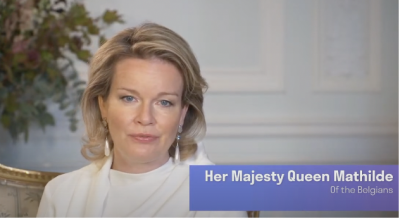 In a pre-recorded video message, Her Majesty Queen Mathilde of the Belgians, a spokesperson for the UN Sustainable Development Goals, mental health champion, and former speech therapist, noted the weaknesses of mental health systems impacted by the pandemic. HM Queen Mathilde explained that the pandemic had uncovered disparities and poverty worldwide. The need to access mental health literature, education, and resources is now more in demand than ever, she said, especially during the Novel Coronavirus crisis. She commended that The Big Event for Mental Health is bringing to light how COVID-19 not only exacerbates the crisis—given a pre-existing lack of mental health care globally pre-COVID—but also demonstrates the role we all have to play to promote this significant issue.
In a pre-recorded video message, Her Majesty Queen Mathilde of the Belgians, a spokesperson for the UN Sustainable Development Goals, mental health champion, and former speech therapist, noted the weaknesses of mental health systems impacted by the pandemic. HM Queen Mathilde explained that the pandemic had uncovered disparities and poverty worldwide. The need to access mental health literature, education, and resources is now more in demand than ever, she said, especially during the Novel Coronavirus crisis. She commended that The Big Event for Mental Health is bringing to light how COVID-19 not only exacerbates the crisis—given a pre-existing lack of mental health care globally pre-COVID—but also demonstrates the role we all have to play to promote this significant issue.
In her message, she presented good mental health as essential to fulfill one's potential, strengthen resilience, and help deal with stressful and traumatic situations. "The COVID-19 pandemic has revealed weaknesses in our health systems in general, and in our mental health systems in particular," her majesty said. "It has highlighted and made worse the factors that put our mental health at risk, like bereavement, isolation, family tensions, or loss of income." She added that the pandemic and increased attention to mental health shows governments, social services, advocates, civil society, and all individuals the importance of strengthening and improving healthcare systems. COVID-19 is a crisis on our physical health, our mental health, and psychological well-being, she noted. Queen Mathilde's words inspired me to pay attention to her call to action. As individuals, we have a role to play to address mental health during this pandemic.
After Queen Mathilde's remarks, a film entitled "Drug Overdose: A Film About Life" was shown. Produced in collaboration with the United Nations Office on Drugs and Crime (UNODC) and WHO, this powerful film showed the effects of the opioid crisis and family loss due to drug use and addiction. More than 500,000 deaths are attributed to drug use annually, and about 115,000 people die annually from an opioid overdose. While these statistics are grim, the film paints a picture of hope and remembrance of those lost to drug use. It also spotlights people who help change, and save, lives. One person profiled in the film, Jonathan, died of a drug overdose. His mother, Cristina Rabadán-Diehl, remembers him fondly as a son "that any mother would have wanted her son to grow up to be." Cristina recalls Jonathan's vulnerability to developing an addiction and references drug addiction not as a choice but as a disease.
In my view, this mother's willingness to openly discuss her son's addiction could encourage numerous others to think of drug use and addiction not as taboo but something that should be addressed head-on. A community-based approach program in Kenya showed this same attitude. Dr. Mercy Karanja, Deputy Director of the Mental Health and Substance Abuse Unit in the Ministry of Health in Kenya, described outreach workers' approach to engaging with the community personally and medically. The program uses methadone maintenance therapy, psychosocial support, and other assessment-based techniques based on an individual's specific needs to address the challenging topic of addiction with a human-based approach, in the same manner, that Cristina did with her son Jonathan.
Another drug treatment program profiled is in Kyrgyzstan. The S-O-S (Stop Overdose Safely) Project, which provides services to more than 5,000 people, includes providing kits with naloxone (a medication that can treat an emergency narcotic overdose) and unique training to individuals willing to help those at risk of suffering from an overdose. The message was clearly illustrated through the film: Investment in addressing drug use is an investment towards primary healthcare and Universal Health Coverage, and investment towards saving lives and livelihoods.
Oke pointed out that talking about mental health in 2020 must also be discussed with COVID-19. The WHO approach in tackling challenging and sometimes taboo subjects have inspired many to tackle other thorny issues, such as institutionalization and suicide/suicide prevention. In the case of institutionalization, mental institution management has been impacted by the pandemic. Marijo Vrdoljak, Director of Sveti Ivan Psychiatric Hospital in Croatia, talked about the stringent implementation measures that COVID-19 has caused concerning individuals' care with physical, mental, and intellectual disabilities. Petar Mikić, a service user of Sveti Ivan program, talked about the pain and impaired well-being he experienced when he realized he couldn't go home during the pandemic (due to lockdowns). Further, the pandemic forced many of the institution's workers to adopt new skills and tactics to aid the service users' recoveries, which can be interpreted as a burden and a potential positive outcome in adaptation to a crisis.
The Big Event for Mental Health has contributed to encouraging the public to talk about suicide and suicide prevention. This talk is essential, given that a person dies from suicide every 30 seconds, equating to almost 800,000 people a year. Lifting this taboo is a positive step, according to the statements given by the widow of Linkin Park singer Chester Bennington, Talinda Bennington, and Klas Bergling, the father of the late-singer Avicii. Both also endorsed the importance of reaching out to those affected by the loss of loved ones from suicide and providing immediate peer and community support to those affected by suicidal ideation. Such open talk can be painful or uncomfortable initially, but is critical and offers hope.
The Secretary-General of the United Nations, António Guterres, made remarks, acknowledging the profound implications and consequences upon mental health created by COVID-19. He stated:
"People all over the world are facing grief at the loss of loved ones, anxiety at the loss of jobs, difficult family dynamics, uncertainty and fear for the future. Older persons face isolation and loneliness. People living with mental health conditions before the pandemic are trying to cope with disruptions to care and worsening symptoms. Also, millions of people living through humanitarian emergencies risk having their mental health needs overlooked entirely."
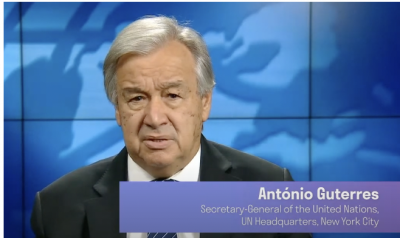 As a result of the pandemic, Secretary-General Guterres called for action early in the crisis to strengthen mental health systems worldwide. Addressing mental health during COVID-19 is central to achieving SDG3 of health and well-being for all and Universal Health Coverage and offers an opportunity to support recovery from this pandemic.
As a result of the pandemic, Secretary-General Guterres called for action early in the crisis to strengthen mental health systems worldwide. Addressing mental health during COVID-19 is central to achieving SDG3 of health and well-being for all and Universal Health Coverage and offers an opportunity to support recovery from this pandemic.
In the recovery of this pandemic, one should focus on their mental health and the proper techniques needed to survive and thrive mentally in a crisis.
During the Big Event, the WHO provided a guide for all that teaches five 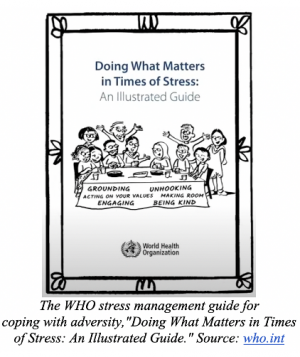 strategies to help manage stress and anxiety during stressful occurrences, like a pandemic. This stress management guide aims to aid those in need with practical self-help techniques and provide tools. These tools include "Grounding," helpful in stressful situations and emotional storms; "Unhooking," useful to detach yourself from distracting thoughts and feelings; "Acting on your values," helpful in identifying values important to an individual and acting on them; "Being kind," useful in noticing pain and responding with kindness; and "Making Room," which aids in pushing away struggling or stressful thoughts and feelings.
strategies to help manage stress and anxiety during stressful occurrences, like a pandemic. This stress management guide aims to aid those in need with practical self-help techniques and provide tools. These tools include "Grounding," helpful in stressful situations and emotional storms; "Unhooking," useful to detach yourself from distracting thoughts and feelings; "Acting on your values," helpful in identifying values important to an individual and acting on them; "Being kind," useful in noticing pain and responding with kindness; and "Making Room," which aids in pushing away struggling or stressful thoughts and feelings.
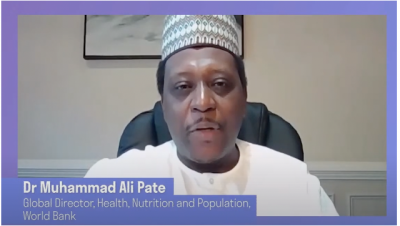 When speaking about mental health investment, the economic perspective must be considered. Dr. Muhammad Ali Pate, Global Director for Health, Nutrition, and Population at the World Bank, gave the Bank's perspective on the future of mental health. Financing contributed by the Bank will scale "the provision of quality health services in it's client countries," said Dr. Pate. It is illustrated that the Bank holds the view that mental well-being is a developmental problem. The World Bank Group has funded many projects and initiatives supporting mental health interventions through public health, education, social protection, and employment solutions. Through human enterprise, said Pate, "the wealth of nations lies in its people...Going forward, continued dialogue will need to take place for reaching the critical mass in seeing health as an investment, not an expenditure."
When speaking about mental health investment, the economic perspective must be considered. Dr. Muhammad Ali Pate, Global Director for Health, Nutrition, and Population at the World Bank, gave the Bank's perspective on the future of mental health. Financing contributed by the Bank will scale "the provision of quality health services in it's client countries," said Dr. Pate. It is illustrated that the Bank holds the view that mental well-being is a developmental problem. The World Bank Group has funded many projects and initiatives supporting mental health interventions through public health, education, social protection, and employment solutions. Through human enterprise, said Pate, "the wealth of nations lies in its people...Going forward, continued dialogue will need to take place for reaching the critical mass in seeing health as an investment, not an expenditure."
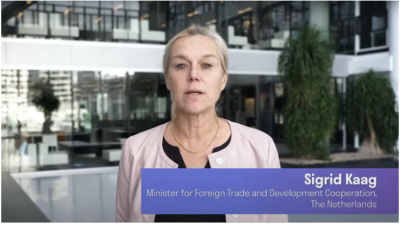 In her remarks, the Minister for Foreign Trade and Development Cooperation of the Netherlands Sigrid Kaag noted how one country could help numerous other countries worldwide with their own mental health services model. While the pandemic is fueling uncertainty throughout the world, Kaag pointed out that the health crisis destroys lives, potential, and opportunities, especially among young people. An investment in mental health is immensely critical to ensure mental and psychosocial well-being for the future. Thus, in her ministerial role, Kaag has put the issue of mental health during COVID-19 on top of the Netherlands International Development Agenda.
In her remarks, the Minister for Foreign Trade and Development Cooperation of the Netherlands Sigrid Kaag noted how one country could help numerous other countries worldwide with their own mental health services model. While the pandemic is fueling uncertainty throughout the world, Kaag pointed out that the health crisis destroys lives, potential, and opportunities, especially among young people. An investment in mental health is immensely critical to ensure mental and psychosocial well-being for the future. Thus, in her ministerial role, Kaag has put the issue of mental health during COVID-19 on top of the Netherlands International Development Agenda.
The Netherlands has been a leader in raising awareness among governments and all stakeholders about the importance of making mental health and psychosocial support (MHPSS) an integral part of the humanitarian response in crisis and emergency situations. Given statistics that 160 million people require humanitarian assistance and psychosocial support today due to conflicts, natural disasters, and other emergencies, Minister Kaag also has made the need to build sustainable mental health systems during and after emergencies a priority in her government. Other ministries pledged to do the same, at a significant multistakeholder meeting held in Amsterdam 7 & 8 October 2019 on the topic of the International Conference on Mental Health and Psychosocial Support in Crisis Situations.
That conference was successful in accomplishing the following:
- Mobilizing commitment from countries and organizations to scale up sustainable and high quality MHPSS during and after disasters and conflicts;
- Increasing the level of commitment by countries and donors to long-term financial support for MHPSS in crises, and identify financing mechanisms;
- Presenting proven, scalable, evidence-based approaches and interventions, and ways to integrate them into humanitarian aid programmes
Of note, consistent with these efforts, the WHO Mental Health Gap Action Program (mhGAP) plays a role in building sustainable mental health and well-being goals, emphasizing the need to scale up the help for mental and neurological disorders, especially in low- and middle-income countries.
Moderator Oke, with short remarks, described the Speak Your Mind campaign to encourage people to talk about mental health. Making a personal statement helps others be creative in advocating and supporting mental health awareness. The campaign uses social media components, like hashtags and filters, and promoted a 24-hour virtual march under the hashtag #MarchForMentalHealth. With these types of engagements, individuals worldwide can use the different types of communications to make a personal investment towards good global mental health.
Further supporting tools towards the advocacy in World Mental Health Day and The Big Event for Mental Health were discussed through animation and imagination, incorporated in the short film for the WHO SAFER initiative (WHO, 2018). In this film, it is mentioned that every year the harmful use of alcohol is ultimately responsible for 3 million deaths and 5 percent of global health burdens. Burdens include road injuries, violence from abuse and neglect, diseases like liver cirrhosis, heart disease, cancer, and mental issues like alcohol dependence, depression, and suicide. The discussion of alcohol, and its effects on one's mental health with overuse, is done in a storytelling format. The film illustrates two countries, "Country A" and "Country B." "Country A" is portrayed as a country with stricter restriction laws on alcohol availability and drink-driving countermeasures. Meanwhile, "Country B" is shown as a country with lax alcohol regulations and statutes. With these two countries in mind, we see "Country A" with positive effects on mental health conditions, well-being, and overall sound quality of life. The SAFER initiative, an acronym, stands for:
- S: Strengthen restrictions on alcohol availability
- A: Advance and enforce drink driving countermeasures
- F: Facilitate access to screening, brief interventions, and treatment
- E: Enforce bans or comprehensive restrictions on alcohol advertising, sponsorship, and promotion
- R: Raise prices on alcohol through excise taxes and pricing policies
Through this WHO alcohol control initiative, the five strategies listed above could help national and local governments reduce the harmful effects of alcohol-related consequences on mental health.
Personal stories and conversations shared during the event help create feelings like comfort, and personal reflection, mentions Oke. In the next film, contributed by UNAIDS in collaboration with WHO, individuals who are HIV-positive share their stories and mental health conditions to audiences worldwide. With mental health conditions co-occurring with other symptoms, it is revealed in the film that HIV particularly hits communities who are the most marginalized, and those affected are often to experience mental health conditions such as depression. In the case of HIV-positive activist Lively Van Wyk in Windhoek, Namibia, she shares the technical and mental health difficulties of initially being HIV-positive: like being unable to have the same physical proximities with others as her pre-HIV diagnosis. As a result, it has caused mental stress and feelings of isolation due to the stigma of living HIV-positive. With integrated health and mental health support, "it could play a very big role, because it just makes things easier for you to know that you have someone to speak to and share whatever you're going through...It starts with people who have this experience with issues of mental health to come out to communities to educate them. You can't just take care of your body, you need to take care of your body, mind, and soul. And the support that we are asking is just to be treated as human beings," stated Wyk.
Remarks were also made by Peter Sands, Executive Director of the Global Fund to Fight AIDS, Tuberculosis (TB), and Malaria. Sands shared that through the Global Fund's experience in their fight with HIV, TB, and Malaria, mental health is also weaved into the process, and mental health problems can have a crippling effect on the treatment of these diseases. Additionally, as Wyk mentioned previously with her HIV diagnosis, it could further worsen mental health conditions with the stigma behind having these diseases. With World Mental Health Day, it could be used to diminish that stigma, states Sands. He asserts, "mental health is indispensable to good health. If we don't deal with mental health, we will not deliver the SDG3 ambition of health and well-being for all."
The First Vice-President of Costa Rica, Epsy Campbell Barr, brings attention to the importance of mental health and well-being. With the help of international organizations, the private sector, and community organizations, "Mental health is a necessary condition for well-being and physical health," said Barr. She also states mental health services must have a human rights approach due to the inclusive nature of quality mental health. Barr recognizes that Costa Rica has made significant steps towards coverage of mental health care services. However, the effects of COVID-19 have created difficulties in completing these steps and have disproportionately affected women during this pandemic.
The iSupport program for carers of people with dementia is introduced in the next segment, Supporting Dementia Carers. With this program, the WHO provides it as a resource for caring for people with dementia to prevent and decrease mental health issues associated with caregiving (WHO, 2019). With around 50 million people living with dementia globally, most of the support provided to these individuals is by close friends and family members. While it is stated that the experience can be a rewarding one, stigma and lack of awareness about dementia can also lead to a lack of support and services for caregivers. The iSupport program and modules provided online help uncover general information about dementia and provide information about being a carer, self-care tips, how to provide proper care to individuals with dementia, and how to address the symptoms of dementia.
Furthermore, Oke introduces the WHO QualityRights initiative, which aims to expose the positive impact of investing in quality care and human rights in mental health. Due to people with mental health conditions often being denied fundamental human rights, like seeking employment, and facing the stigma of having a mental illness, it could further prevent these people from seeking proper treatment, said former WHO representative in Beirut Dr. Gabriele Riedner. The program aims to reform mental health services, and promote human rights, for individuals with intellectual and cognitive disabilities by improving quality of care in inpatient/outpatient mental health services, push a community and recovery-based approach for mental health services, advocate for people with mental illnesses by creating a movement, and reform national legislation and policies (WHO, n.d.). Currently, the QualityRights initiative is introduced and expanded in 31 countries globally, and the goal of the WHO is to implement the program worldwide by 2030.
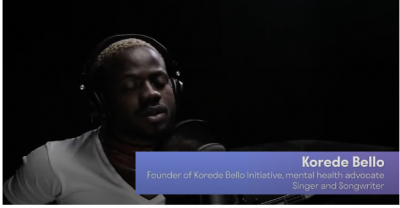 Nigerian singer and songwriter Koredo Bello, best known for his hit single "Godwin," a semi-gospel and pop song which became a national anthem and topped many music charts across Nigeria, performed "Favorite Song" during the event. The founder of the Korede Bello Initiative, a youth-led NGO for young people's development, performed an emotional song about support and being there for someone when they are facing difficult times. Bello states, "There's no health without mental health, and I personally believe that we can achieve global peace if we can achieve internal peace."
Nigerian singer and songwriter Koredo Bello, best known for his hit single "Godwin," a semi-gospel and pop song which became a national anthem and topped many music charts across Nigeria, performed "Favorite Song" during the event. The founder of the Korede Bello Initiative, a youth-led NGO for young people's development, performed an emotional song about support and being there for someone when they are facing difficult times. Bello states, "There's no health without mental health, and I personally believe that we can achieve global peace if we can achieve internal peace."
President of the Maldives Ibrahim Mohamed Solih said, "As we work towards overcoming the downturn caused by COVID-19, the importance of mental health has become even clearer." He also made sure to thank all the tireless support by the individuals who assist those suffering from mental health issues, especially now during the pandemic crisis. With his administration, they plan to take concrete steps in promoting good mental health and well-being, states President Solih. With the Maldives' first mental health center at IGM hospital, expanding mental health in other regions, drafting legislation to ensure mental health protection, and increasing funds for mental health services, President Solih shows genuine initiative in advancing Universal Healthcare.
In closing remarks, WHO Director-General Dr. Tedros thanked all the participants and advocates involved in creating the first WHO virtual World Mental Health event. He also reminds the audience that while the Big Event has reached its end, the WHO will continue "working every single day to increase awareness of mental health issues, increase investment in mental health, and to increase access to mental health services everywhere because ultimately there is no health without mental health."
Investment in My Future
My attendance of The Big Event for Mental Health made a significant impact on me personally and professionally. I had many reasons for why it was a campaign I couldn't miss. First, as a young person dealing with the woes of a failing economy, lacking job perspectives, rising student-debt, a troubling political atmosphere, rising climate-change, and low economic prospects, mental health was something I always emphasized. As a Black person with a Catholic upbringing, mental health discussion was not widespread in my community. But with my discovery of World Mental Health events, before 2019, I've discovered a community that is not only unafraid to discuss such matters but was also willing to connect to peers like myself in similar situations. Secondly, during the COVID-19 crisis, I've had personal reasons to choose this event. While contracting COVID-19 and dealing with my grandmother's loss due to COVID, I was intrigued and willing to connect with individuals who have gone through similar situations. I needed to reassure myself that while things are pretty tough at the moment, there is a community of advocates, governments, civil societies, and college students who are not willing to leave the fight in mental health and who are eager to continue the investment in not only our future but also of future generations. I wanted a community of peers that would hold national and international leaders, governments, and corporations responsible for the possibility of a positive future.
Thirdly, and lastly, professional reasons also drew me towards joining this Big Event. Before the pandemic, the appeal of working with children in a psychosocial context was what I always aimed to do. Now during the pandemic, my feelings have only not changed, but they have been strengthened. Additionally, working for a non-profit for children with mental and intellectual disabilities has reaffirmed my advocacy towards protecting children who cannot defend themselves, especially during humanitarian and global health crises. Further, the need for youth-advocates like myself is needed now more than ever, when the future depends on our and others' investment, depends on our voices being heard loud and clear, and depends on us taking action.
To get committed to the mental health initiative, Speak Your Mind, visit https://gospeakyourmind.org and use the hashtag, '#MoveforMentalHealth,' to continue to be part of the mental health discussion worldwide.
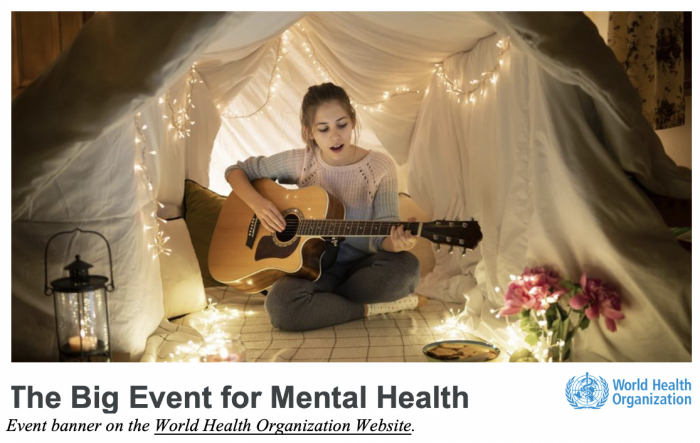
EVENT OVERVIEW:
TITLE: The Big Event for Mental Health
Date/Time: Saturday, 10 October 2020, 10:00AM-12:30PM EST.
Location: Virtual Event. Platforms: Facebook, Youtube, LinkedIn, and TikTok
Moderator: Femi Oke
Panelists: Cynthia Germanotta; President and Co-Founder of Born This Way Foundation and WHO Goodwill Ambassador for Mental Health, Alisson Becker; goalkeeper for Liverpool Football Club and the Brazilian National Football Team and WHO Goodwill Ambassador for Health Promotion, Natália Loewe Becker; medical doctor and WHO Goodwill Ambassador for Health Promotion, Talinda Bennington; widow of Linkin Park lead vocalist Chester Bennington and founding partner of the mental health advocacy organization 320 Changes Direction, Klas Bergling; father of DJ, musician and producer Tim Bergling, aka Avicii, and Co-founder of the Tim Bergling Foundation, Korede Bello; Founder of the Korede Bello Foundation, mental health advocate, and singer and songwriter from Nigeria, Jonny Benjamin; mental health campaigner, film producer and public speaker, Her Majesty Queen Mathilde of the Belgians, Ibrahim Mohamed Solih; President of Republic of Maldives, Epsy Campbell Barr; First Vice-President of Costa Rica, Sigrid Kaag; Minister for Foreign Trade and Development Cooperation, the Netherland, António Guterres; United Nations Secretary-General, Peter Sands; Executive Director of the Global Fund to Fight AIDS, Tuberculosis and Malaria, Muhammad Ali Pate; Global Director, Health, Nutrition and Population, World Bank
Reported by Crystal Nuñez, a student pursuing a master's degree in Developmental Psychology in the Department of Human Development at Columbia University Teachers College, and a student in Professor Judy Kuriansky's course on "Psychology and the United Nations." In addition to scholarly work, Crystal Nuñez has four years of experience working with individuals (youth and adults) with physical, mental, and intellectual disabilities from low-economic backgrounds at the non-profit AHRC. Crystal Nuñez is interested in the United Nations Children's Fund (UNICEF) and the Office for the Coordination of Humanitarian Affairs (OCHA).
Cite this article as: Nunez, C. (2020). The Big Event for Mental Health: A WHO initiative on Global Awareness and Investment in World Mental Health. International Association of Applied Psychology: IAAP at the UN. Retrieved from https://iaapsy.org/iaap-and-the-united-nations/reports-meetings-events/the-big-event-for-mental-health-a-who-initiative-on-global-awareness-and-investment-in-world-mental-health/

